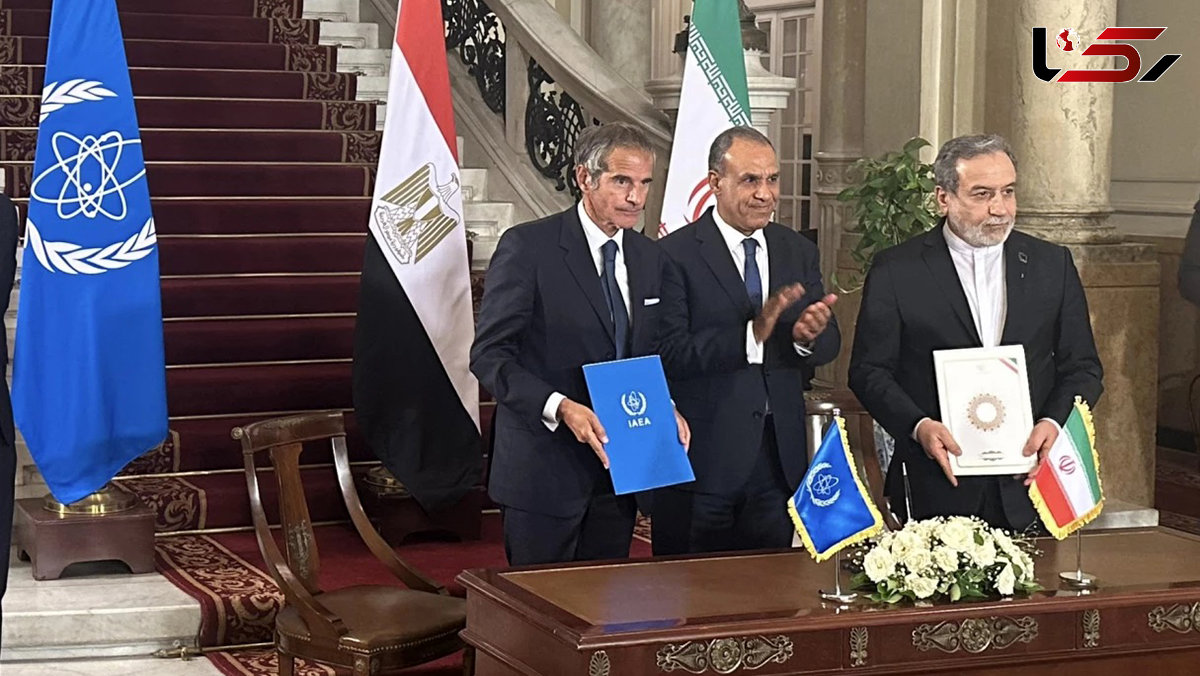Statement of the Secretariat of the Supreme National Security Council Regarding the Iran-IAEA Agreement
Rokna Political Desk: The Secretariat of the Supreme National Security Council (SNSC) issued a statement declaring that the text of the arrangements agreed upon between Seyed Abbas Araghchi and Rafael Grossi was reviewed by the Council’s Nuclear Committee, and that what has been signed is precisely what was approved by this committee.

The statement also added that in the event of any hostile action against Iran and its nuclear facilities, including the reinstatement of terminated UN Security Council resolutions, the implementation of these arrangements will be suspended.
According to Rokna, quoting the Secretariat of the SNSC, the Secretariat today (Sunday, September 14) issued a statement following the agreement signed between Seyed Abbas Araghchi and Rafael Grossi.
This statement concerns the arrangements signed between the Minister of Foreign Affairs and the Director General of the International Atomic Energy Agency regarding the manner of interaction between Iran and the Agency under the new circumstances created after the military attacks by the Zionist regime and the United States against nuclear facilities of the Islamic Republic of Iran under safeguards.
The report, after obtaining the opinion of the Council, will be submitted to the Agency
The statement declared: the text of these arrangements was reviewed in the Nuclear Committee of the Supreme National Security Council, and what has been signed is, in total, exactly what was approved by this committee.
Seyed Abbas Araghchi, on Thursday night (September 11), in a televised interview and in response to the question of whether Parliament was informed of this agreement, stated: “Yes, certainly. The decision was made in the Supreme National Security Council, of which the Speaker of Parliament is also a member.”
The statement added: The Nuclear Committee, composed of senior officials of various relevant institutions, has in all periods been authorized by the Supreme National Security Council to make decisions, and in this case also acted in accordance with the usual procedure.
The statement further said: Regarding the nuclear facilities under IAEA supervision in Iran that were attacked by the United States and the Zionist regime:
First, after the creation of the necessary security and safety conditions, Iran will submit its report to the Agency only after obtaining the opinion of the Supreme National Security Council.
Second, in the next stage, the executive methods of cooperation between Iran and the Agency concerning the report submitted to the Agency must be agreed upon by the two sides, and in particular, in accordance with internal procedures, the implementation of any action must be approved by the Supreme National Security Council.
In the event of any hostile action against Iran, the implementation of the agreement will be suspended
The statement emphasized: In the event of any hostile action against the Islamic Republic of Iran and its nuclear facilities, including the reinstatement of terminated UN Security Council resolutions, the implementation of these arrangements will be stopped.
Seyed Abbas Araghchi and Rafael Grossi, following three rounds of negotiations between Iran and the Agency after the attack on Iran’s nuclear facilities by the Zionist regime and the United States—which had led to the approval by Parliament of a resolution suspending Iran’s cooperation with the Agency—on Tuesday in Cairo, in a meeting lasting nearly five hours, reached an agreement on a new protocol for cooperation between Iran and the International Atomic Energy Agency.
On Thursday night (September 11), in a televised interview regarding the agreement reached between Iran and the Agency, Seyed Abbas Araghchi said: “The agreement defines a new framework for cooperation. The Agency has accepted that the attack on our facilities was illegal, contrary to international law, the UN Charter, and the IAEA Statute. It has also accepted that a new situation has arisen requiring new cooperation. The Agency has further accepted that the law of Parliament is binding for Iran, and that this cooperation must take place within the framework of this law. It has also been accepted that everything will be carried out through the Supreme National Security Council, and the names of the Supreme National Security Council and Parliament are mentioned several times in this agreement.”
The Foreign Minister added: “Regarding facilities that were not bombarded, the new rule is that the Agency will submit requests to us case by case for its access, and according to the law of Parliament, these requests will be referred to the Supreme National Security Council. If approved, access will be granted.”
He also stressed that the validity of this agreement remains only as long as no hostile action is taken against Iran, including the activation of the snapback mechanism. “If the activation of this mechanism ultimately takes place, then this agreement will no longer be valid.”
On Saturday (September 13), Seyed Abbas Araghchi attended the emergency session of the National Security and Foreign Policy Committee of Parliament in relation to this agreement, and after his presence described the meeting as very good and constructive, saying that there was an extensive discussion regarding the recent agreement between Iran and the Agency, and that he had responded to all the questions to the best of his ability.
Send Comments